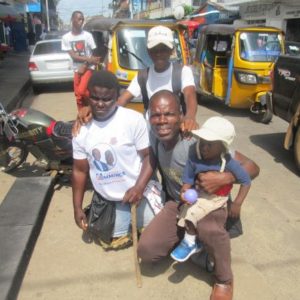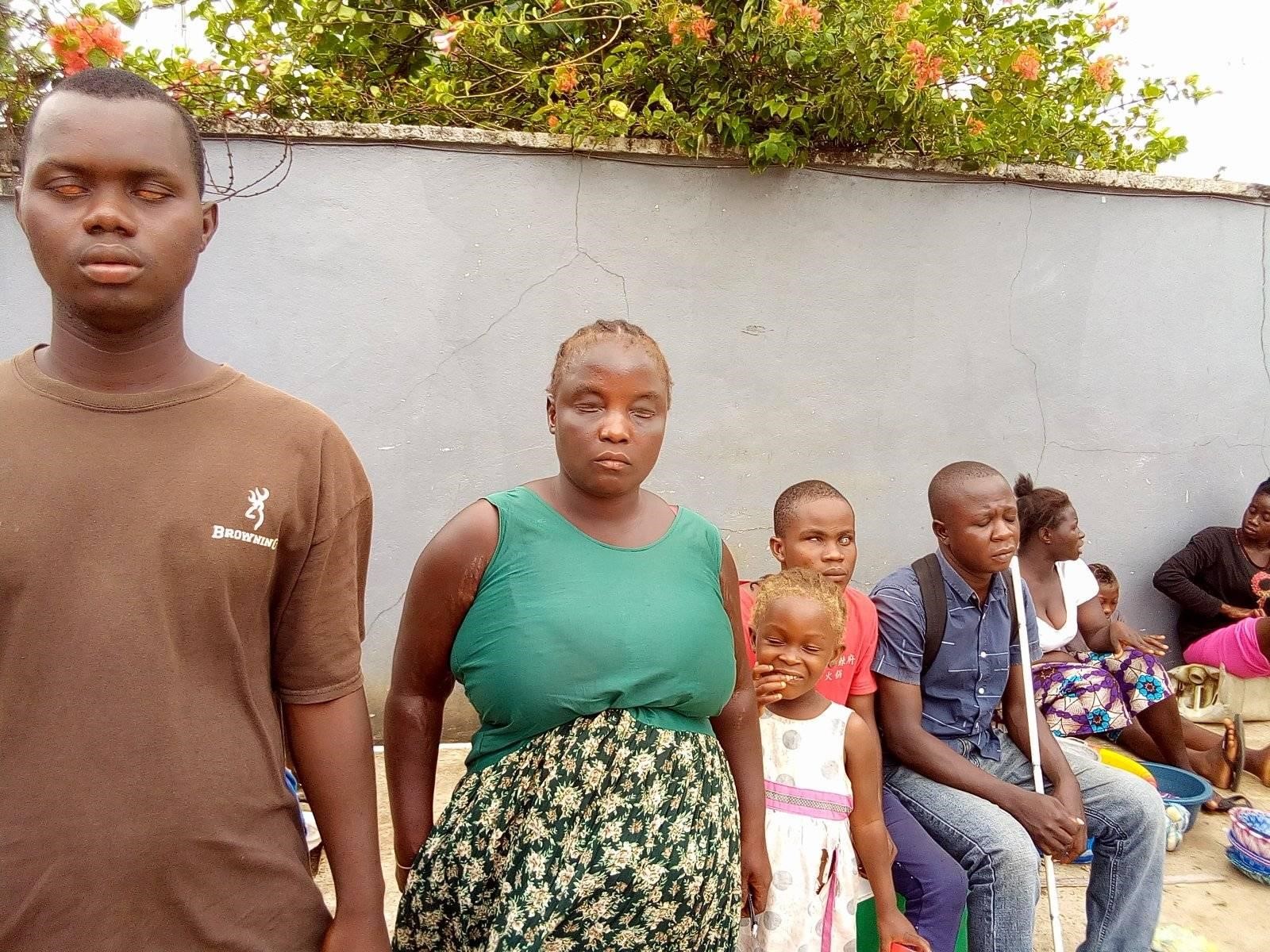PHOTO: Partial view of the line of visually impaired beggars on 25th Street, Sinkor, Monrovia (June 18, 2020)
By Samuel G. Dweh, samuelosophy@yahoo.com,samuelosophy1@gmail.com
Call: +231 (0) 886618906/779583266
People living with disabilities, including the blind and the physical challenged, have borne the worst of the sufferings occasioned by the outbreak of the Coronavirus or COVID-19 in Liberia, amid stringent health and social regulations that normally the physically challenged and the blind population would hardly cope with.
Against this backdrop and with the empathy employed by this writer, suggestions that concluded this article are meant to advance valid recommendations—solution methods to ameliorate the suffering of these prime disadvantaged citizens, who also hold valid citizenship to this country and need to be protected.
Since March, 2020, Liberia has been battling with a “strange” respiratory sickness named Coronavirus—medically named “COVID-19”— which originated from China, according to reports in the Western Media. The “thing” entered Liberia through a top government official— the then executive director of the Environmental Protection Agency (EPA)—who had returned home from a Climate Change-related International Conference held in a Western Country, according to the Liberian Government’s Chief Medical Office.
On April 8, 2020, President George Manneh Weah declared a State of Emergency in a nationwide address regarding the outbreak of the Corona Virus pandemic in the country. The President’s declaration crippled the nation’s economy as the Government destroyed traders’ market tables to decongest the huge concentration of sellers and buyers in open-market places. The government, as a result of the President’s address to the nation on the COVID-19 situation, closed all entry points thereby forbiding internal commutation and external travel that has hindered trade and commerce at a time Liberia was getting much of staple foods from neighboring Countries.
Liberia’s “vulnerable community”— persons living with disabilities, including the elderly, single mothers, children, etc. – was most affected by the government’s action than any sector of the population of the country.

A disabled single mother (half legs) that tours with her children during her survival-based street-begging. Journalist Samuel G. Dweh holding her three-year-old child on Benson Street. Her senior child standing at the back.
When national hunger-related lamentations—especially from members of the “vulnerable group” began filtering into the President George Manneh Weah’s private home and his office, the Head of State responded by instructing the Ministry of Commerce & Industry (MOCI) to distribute “COVID-19 Stimulus Package” comprising rice, beans and vegetable oil to the homes of the most “vulnerable people”. Accordingly, contents of the ‘package’ were distributed, starting from May 25, 2020.
For transparency in distribution, the government collaborated with the United Nations World Food Programme (WFP) to distribute food items comprising rice, vegetable oil and beans—across Liberia’s 15 counties; but complaints of ‘marginalization’ thrived from some groups of the country’s community of disabled people which were relayed by the media.
On Thursday, September 17, 2020, a group of visually impaired persons (children and adults)—of the “Hope For God Association of the Blind”—conglomerated at the gate of the Ministry of Foreign Affairs (hosting President George Manneh Weah’s Office), brandishing placards with various inscriptions relating to their need of the COVID-19 Stimulus Package. The placard/banners contained incriptions such as: “WFP Where Is Our Food?” and “WFP, Please Give Our Food”.

A woman (right) totes her family’s two bags of rice at Capitol Bye-Pass distribution point (Friday, July 3, 2020)
Up to the time (August, 2021) this article was being prepared, the stimulus package had not reached most “vulnerable” groups, not even those at the President’s County—Grand Kru—have received a pinch of any of the food items released since May, 2020—fourteen (14) months after the distribution started. That means the “vulnerable groups” in the County which is located inLiberia’s current impoverished geo-political setting and is hardly accessible due to deplorable conditions of roads linking counties of the region, including Maryland, Grand Gedeh, and Sinoe are yet to be served.
Each of the routes making possible the inter-connectivity of counties in the region, especially ones connecting the President’s County is a “death trap” of mudslide, dismantled outdated wooden bridges of over fifty years now, and narrowness of some of the roads, lying inches away by creeks or bodies of water running dozens of feet deep.

Another group of disabled Liberians during celebration of International Day of Persons with Disabilities—IDPD (2018)
Before outbreak of COVID-19 into Liberia, or when the George Weah Government relaxed the enforcement of the health protocols occasioned by the pandemic, disabled people—living hundreds of miles from their “hustle base”—could afford the general transportation fare (100, 50, 20, or 10 Liberian dollars) demanded by operators of commercial vehicles (buses, taxis, tricycles or commercial motorbikes otherwise referred to in Liberia as “Kehkeh”). Many of them could afford the transportation fares with the assistance of their neighbors through “credit” to be paid (with interest) upon return from the “hustle”.
Many single mothers engaged in petty-businesses — who usually take one or two of their children on the “roving trading” mission—are in this painful “sustainability boat” with the disabled people, most of whom are doing “street begging”.
But with the government’s reintroduction of the “stringent” anti-COVID-19 pandemic health protocols, especially at the advent of the new variant, most of the disabled people have returned to the “painful living condition” that had been before the renewal of the anti-COVID-19 health protocol ordered by the government.
This renewal of the health protocol as announced by the Minister of Health on behalf of the government rendered PwDs who do not have anything to sell as the worst victims, thereby subjecting them to live at the mercy of either a goodwill government officials or a religious organization to help.
Many can no longer leave their residences nowadays, subjugated by either hunger or sickness.
The absence of a well-functioning social welfare programs by the government for the country’s disabled community has made the “economic plight” of these disadvantaged people, especially the physically challenged, more complicated. A government care program that could ensure regular supply of food items as well as medication could have served as “ameliorative mechanism” for these “vulnerable groups”.
Political leaders in sisterly countries have put in place these kinds of social welfare structures that gear towards improving the living condition of their disadvantaged populations.
On mobility, the major cause of suffering of disabled people is the high transportation fare charged by commercial drivers. And operators of commercial vehicles are justifying the high cost. Bickering usually ensued between commuters and commercial motorists on the hiked transport fares occasioned by the renewed health regulations. But a tricycle operator in defense of the exorbitant fairs insisted saying, “I can’t take the old price, seventy five dollars, until the gas sellers bring down the price per a liter to three hundred, from the six hundred they are currently selling it.”
A male tricycle operator plying the Matadi/Airfield-Central Monrovia further argued, “Unlike before, the government has stopped kehkeh riders from taking three passengers at the back seat where we used to take this small amount of money, because of then number of passengers we used to take. Many say that if the government truly cares for the poor citizens to ride bus, taxi or kehkeh at a cheaper cost, they should give order for [gasoline] price to go down to three hundred dollars per gallon.”
He was arguing with a commuter in his vehicle, who lambasted at him of “cheating passengers, using the anti the COVID-19 pandemic protocols as an alibi to hike the cost of transportation in the Country.” I was one of the passengers on the tricycle.
In Liberia, there are two points of sale of gasoline, one being prewar at filling stations and the other being the post-war “sold-in-bottle points”. The latter receive their supply from operators of gasoline tankers, after supplying to the old-time points. The in-bottle has advantages over the old-time point’s: smaller quantities (quarter liter three-quarter liter) and smaller amounts (fifty Liberian dollars to seventy five dollars). The old-time’s point sells only from one gallon, which is now being sold at six hundred and twenty Liberian dollars (equivalent of about four U.S. Dollars). But the in-bottle type of sale has a major disadvantage to motorists as some of the sellers mix the gasoline with water for profiteering.
Operators of the other commercial vehicles (buses and cars) are “justifying” their “high transport fares”—on taking three passengers (at the back), which is a mandate from the government to prevent spread of COVID-19, and the “high cost for gasoline”
RECOMMENDATIONS
To remedy some of the difficulties being faced by the population, mainly the PwDs who are then most vulnerable group in society, the George Manneh Weah-led Government should consider providing special buses (preferably, some of the National Transit Authority buses offered by the Indian Government) to be convey disabled people, especially the visually impaired (blind), to the points they would get their daily bread. Pick up points should be established and announced over radio stations or published in newspapers.
The government should also consider supporting financially operators of commercial vehicles to give “free ride” to members of the Country’s “vulnerable group”, and publicize the “free ride” in the various media.
To ensure smooth implementation of these recommendation as mentioned above, the government should prepare “mobility tickets” for the vulnerable people through a collaborative structure of the Information arm of the MGCSP’s “Social Protection”, a body of road-side money changers, and the Liberia National Police (to serve as “monitoring arm” of the collaboration).
Any “vulnerable group” member with this ticket will show it to any commercial vehicle operator stopped. After conveying the “vulnerable group” member, the vehicle operator will take the ticket to a member of the body of road-side money changers to give the amount written on the ticket. The money changer will take the ticket to the MGCSP for reimbursement with a “little interest” (to cover the transport fare spent by the money changer to get to the MGCSP). This is an alternatively method to the first recommendation.
Besides, the government should consider creating “feeding centers” reminiscent of a COVID-19 stimulus package for members of the “vulnerable groups”, especially visually impaired (blind) persons.
The needy persons should be grouped into “zones”, according to communities in which they reside in a manner similar to “feeding methods” used by the United States Government, or authorities of States of America, for their citizens who are “financially handicapped” or “homeless”. Finally, the “insensitivity” or “empathy” of the Liberian government toward its “economically disadvantaged citizens” will be shown in its “action” This Report was made possible with support from Internews Liberia Inclusive Media Project.

